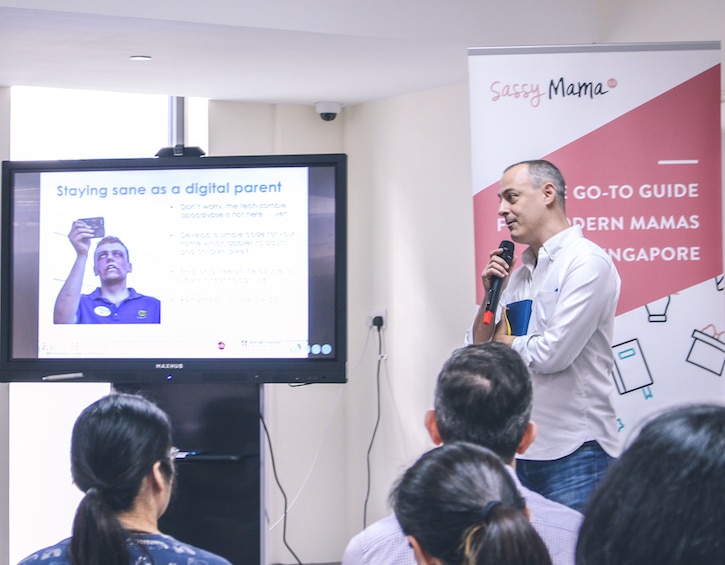
Parents, educators, and tech experts weigh in on the best ways to keep kids safe on the Internet (hint: it’s not keeping them off of it completely!)
Earlier this year we told you about Singtel Surf School, mamas: it’s a programme that takes a 360-degree approach to Internet safety for kids, from allowing parents and children to share mobile data, to teaching kids how to navigate the Internet through its three main pillars: Surf Safe, Surf Fun and Surf Together.
When it comes to surfing safe, check out the app Qustodio, which handily provides parents control over what content can be viewed on a multitude of devices. Qustodio works on smart phones, tablets and computers, on both 4G LTE networks and Wi-Fi. It also notifies you when your child is trying to access undesirable websites or content.
Even cooler, it allows you to set a screen time schedule, or a daily time limit for games and apps. Its super handy dashboard summarises your child’s daily Internet usage, and can also allow you to monitor their time spent on social networks, calls and and even the content of SMS messages. In case of emergency, Qustodio allows you to track your child’s location.

Of course, the most important thing Qustodio does is assist parents in starting the conversation about online responsibility. As covered in our recent expert panel series at EtonHouse International School @ Orchard andSingapore American School, the key to ensuring your kids stay safe on the Internet and make smart choices is trust and open communication. Qustodio doesn’t intrude on your child’s iCloud passwords; think of it as a safety net as your kid learns the ins and outs of navigating the web.
Craig Kemp, Head of Educational Technology at Stamford American International School, had some other great tips for encouraging good digital citizenship in our kids, such as encouraging the use of apps that boost learning; letting kids watch shows with positive socialization skills that teach empathy, honesty and respect (paging Daniel Tiger!); and making time for coding, which helps develop critical thinking and problem solving skills.

A key theme that we heard from both the head of Technology at GEMS World Academy (Singapore) and tech-savvy parents who work at Google and Microsoft is that you should never ban or block phone or Internet usage; it’s all about setting daily limits, teaching kids self-control, and of course modeling acceptable digital behaviour ourselves. Perhaps that means no mobile phones at the dinner table, or setting limits on Internet usage that the whole fam must follow.
This comes back to the another pillar of Singtel Surf School: Surf Together. With Singtel, parents can share their existing mobile data, talk, and text with their child via MobileShare. This not only saves you money, but it’s also the perfect way to help set limits on your child’s mobile phone usage. Meanwhile, Surf Fun partners up with popular content providers like Disney, Nickelodeon and Spotify to offer kid-friendly content through a variety of value-added services. These are brands you can feel good about your kids engaging with, and know they’ll be able to have fun safely while on the go. Parents can also visit Common Sense Media for more fab tips on navigating life in the digital age.

One final takeaway that all our digital experts – including parents, educators, and pros from Singtel – agreed upon is that kids can usually find a way around restrictions or barriers. It’s better to be open and empower your kids than to be overly restrictive and force them to go behind your back (which is when they’re most apt to get into real trouble). Technology moves at a pace that most of us – adults in particular – can barely keep up with. It’s ok to revaluate rules and guidelines as we go along, so long as trust and open communication form the solid foundation of our digital relationship with our kids.
To learn more, mama, visit www.singtel.com/surfschool or step into any Singtel Shop. And remember to have fun surfing together!






 View All
View All





 View All
View All









 View All
View All





![[𝗦𝗔𝗩𝗘 𝗧𝗛𝗜𝗦] 𝗞𝗶𝗱-𝗔𝗽𝗽𝗿𝗼𝘃𝗲𝗱 𝗗𝗲𝘀𝘀𝗲𝗿𝘁 𝗦𝗽𝗼𝘁𝘀 𝗬𝗼𝘂 𝗖𝗮𝗻 ‘𝗘𝗮𝘁 𝗳𝗼𝗿 𝗙𝗿𝗲𝗲’ 𝗪𝗶𝘁𝗵 𝗖𝗗𝗖 𝗩𝗼𝘂𝗰𝗵𝗲𝗿𝘀! 🍦🍩🧁😉
Before you ask “Can use CDC voucher?” Yes, you definitely can! These spots are perfect for an after-school treat, weekend fun, or just saying “yes” to dessert without saying goodbye to your wallet.
Comment “Sweet” or tap the link in bio for more foodie recommendations!
Got a fave kid-friendly spot that accepts CDC vouchers? Let us know in the comments too!
.
.
.
.
.
.
.
#CDCVouchersSG #SGMumLife #KidFriendlySG #FreeDessert #HeartlandEats #SweetTreatsSG #SGParents #FamilyFunSG #WafflesAndIceCream #BudgetParenting #ThingsToDoWithKidsSG #SGCafes #SupportLocalSG #KidsEatHappy #CDCAdventures](https://www.sassymamasg.com/wp-content/plugins/instagram-feed/img/placeholder.png)
